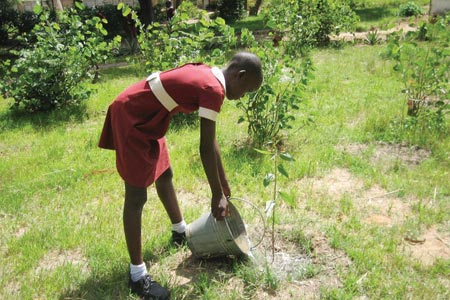
It is highly evident most people believe the business of saving the environment from further deterioration is a job for environmentalists, governments, local authorities and big corporates — a frame of mind that has only served to exacerbate an already terrible situation.
BY Chipo Masara
Take litterbugs for example. They go around discarding of their litter in the most inappropriate places — mostly on the streets — believing that it is local authorities’ job to clean after them and ensure that the streets are kept clean. Unfortunately — owing to a number of reasons — Zimbabwe is not that well-run and thus local authorities do not have the capacity to clean up every street. As a result, the litter continues to pile up. It is no wonder then that the capital city, for instance, is now a far cry from the once famed “Sunshine City”.
But then, it should go without saying that to those that much has been given, much is also expected. Thus, those entities that have benefitted much from the environment — the likes of mining companies — would obviously be expected to give back in a manner that ensures future generations that will come after us also get to enjoy Mother Nature. That’s why it is expected that once mining companies finish extracting the precious minerals, they undertake extensive land rehabilitation exercises that help to — at the very least — restore the landscape to the state it would have been in before the mining commenced. It is bad enough that by the time some yet-to-be-born children join the world, precious minerals like diamonds, gold and platinum in the country would be nothing but a distant memory!
Unfortunately, most mining companies — mostly Chinese firms — have a propensity for evading the laws and have a tendency to abandon areas once they have exhausted them of their resources, thereafter leaving them an eyesore. And then there are farmers — especially those that are into tobacco farming. The bulk of them either cannot afford or do not wish to purchase coal to cure their golden leaf, so they resort to cutting down trees — mostly the slow-maturing indigenous ones that would have taken decades to reach full maturity — which they harvest in large amounts and store for their curing processes. While their farming ventures benefit mostly themselves and their families, the cutting down of the country’s trees is in a major way aiding deforestation — which adversely affects the general populace. Travelling around the country, it is clear to see that Zimbabwe has lost an enormous amount of trees and while it would not be fair to wholly blame tobacco farmers for deforestation, they certainly have played a significant role.
Unfortunately, global warming and climate change — currently ravaging the country — has been proven to bite the hardest in the face of deforestation. Without enough flora to help mitigate against climate change by sucking in the greenhouse gases deposited into the air, the situation is bound to get that much more catastrophic! For their part, tobacco farmers are urged to heed the instruction to each plant a woodlot of the fast-growing eucalyptus trees that they can instead use in curing their tobacco, seeing as they cannot afford to buy coal — as previous white commercial tobacco farmers used to do. It is, however, still not clear why most tobacco farmers still have not acted on the directive to establish the woodlots.
But then, even at a household level, there are numerous ways individuals and families can help save the environment.
- Chamisa under fire over US$120K donation
- Mavhunga puts DeMbare into Chibuku quarterfinals
- Pension funds bet on Cabora Bassa oilfields
- Councils defy govt fire tender directive
Keep Reading
Probably because of the long intervals in the past decade or so that people have had to spend without electricity, it is common when there is supply to see lights switched on in broad daylight. I am not quite sure what psychologically explains this, but it is easy to conclude it is a way to make up for all the time they would have gone without power. Unfortunately, more than wasting energy and money, it makes the climate heat up even more intensely as most electricity is made from fossil fuels. If everyone switches off the lights whenever they leave a room, greenhouse gas emissions would be reduced significantly.
Even though the eco-footprint of each step in an attempt to save the environment may be small, millions of people doing the same thing will make a difference. Seemingly simple things like turning off appliances when not using them, switching to energy-saving bulbs, recycling, using less water, buying fuel-efficient cars and planting trees, among many other “little” ways, go a long way in helping.
Helping save the environment isn’t a preserve for governments, environmentalists or big corporates as each individual has a part to play.
l For feedback, email at [email protected]












